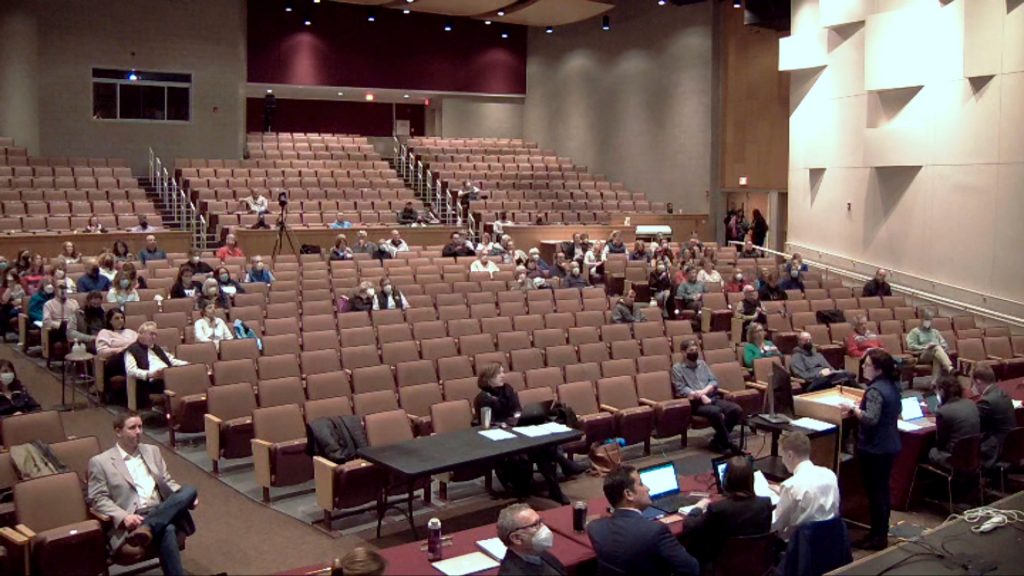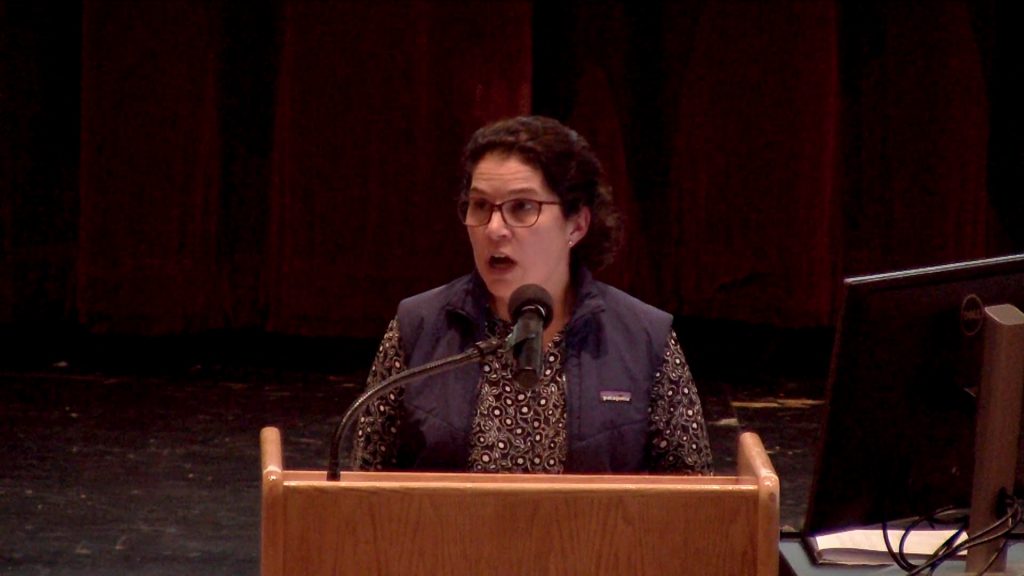Article 15 – Amending the Downtown Smart Growth District

Reading, MA — The third session of Annual Town Meeting focused entirely on Article 15, which is a series of amendments to the zoning bylaw regarding the 40R smart growth district covering forty-eight acres of downtown Reading. Town Meeting and Community Planning and Development Commission (CPDC) member Heather Clish presented a long and detailed overview of what the bylaw changes intend to update.

The 40R district is one in which the town works with developers to allow certain waivers for building height, density, and other zoning requirements in exchange for providing more commercial space in the downtown area. The state created the 40R district to encourage growth in traditional downtown areas, especially those with easy access to public transportation. Reading’s adoption of 40R has led to several projects in the downtown, such as the Postmark building on Haven Street, RISE 475 on Main Street, and the newly approved project on Chute Street.
Clish shared the process which was undertaken over the past year by CPDC to develop the proposal. This process included several public workshops on downtown development, a citizen survey that garnered over 1,100 responses, and multiple public meetings on the topic. Clish shared that this process and its results led CPDC towards four primary goals: to align zoning changes with broad community sentiment, propose changes that get at the intent of the instructional motions by Town Meeting that spurred the process to get started, requiring developers to offer public benefits in exchange for density waivers, and continue to inspire investment in Reading through a sophisticated waiver-based approach to zoning.
Clish continued, stating that these goals led to proposed zoning amendments in five broad categories: the promotion of open space through an expanded definition; protections for abutting uses; changes to the “as-of-right” zoning for dimensional setbacks, parking requirements, commercial components, and affordable components; an innovative tiered approach to waiver requests; and alignment and clarification of the bylaw.
Clish explained that most of the effort is in the fourth area of waivers, specifically the density waiver. Density would be capped at sixty-five units per acre, with a menu of required items to be fulfilled for each level as requested density increases. Clish shared that developers would be allowed to choose one item on each tier as their requested density for a project increases. Items on the “menu” include more open space, an increased percentage of commercial space in the project, more parking, and historic preservation.
Clish indicated that CPDC hopes that the tiered approach will lead to more collaboration and negotiation with developers than a prescriptive approach to zoning would allow. Clish also noted that none of the projects that have been built or approved in the downtown under 40R, except the small three-unit Chapin Avenue residential project, would have been approved as they were built had the proposed regulations been in place.

Town Meeting member David Talbot offered an amendment reducing the density cap at fifty units an acre, which was then amended to fifty-five. Talbot argued that the proposed cap at sixty-five was simply too great. After considerable discussion, the amendment failed in a hand vote. Town Meeting member Bernie Horn proposed an amendment increasing the size of compact parking spaces to nine feet wide from eight feet wide. Development Director Julie Mercier noted that eight-foot-wide spaces for compact vehicles are standard. The amendment failed by a vote of 57-72.

Horn also proposed an amendment to require units with more than one bedroom to have two parking spaces per unit. As proposed by CPDC, units with greater than two bedrooms will have that requirement. Horn spoke about frustrations that current occupants of the new developments have had with acquiring parking for their vehicles. Horn also pointed out that there is currently no overnight parking allowed in downtown municipal parking lots, leaving many of these vehicles on the streets. Horn further proposed that commercial units be required to provide four designated parking spaces. Currently, commercial units are not required to provide spaces if they are within 300 feet of an existing municipal parking lot. This amendment failed by a vote of 39-91.
Town Meeting member Angela Binda proposed an amendment to alter the definition of open space in the proposed bylaw to align with the description already set in the larger bylaw. Clish indicated a preference for the current proposed definition to remain as the 40R district is unique, suggesting the CPDC’s proposed definition fits the district better. By a hand vote, Binda’s amendment failed.
After a failed motion by Town Meeting member Bill Brown to indefinitely postpone the article, Town Meeting adjourned at 11:20 pm and will reconvene on Thursday at 7:30 pm.
